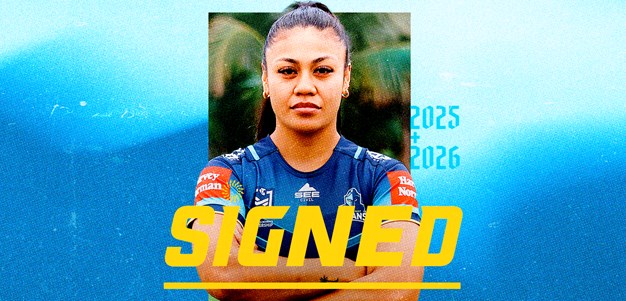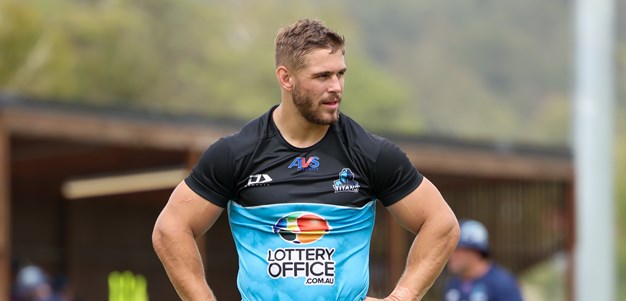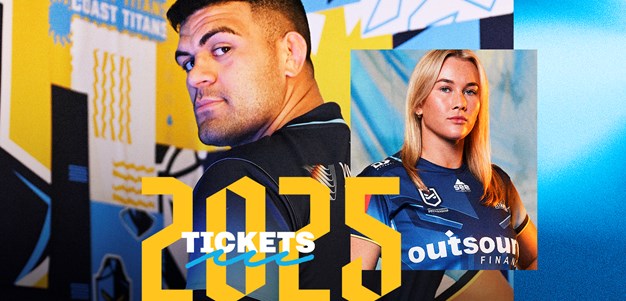

IT will be one of the most emotional and stirring build-ups for any NRL match when the Titans walk out onto Mt Smart Stadium in Auckland on Saturday to the only trans-Tasman ANZAC Day clash of the five-game celebration of the 100th anniversary of the Gallipoli landing.
And leading the team out will be Titans’ popular backroom man Darrell Madge, sporting his battalion cap and war medals and, no doubt, misty eyes.
At a time when all NRL players will be drawn to history of war and the legendary ANZAC spirit, Darrell – a former Manly lower grade halfback and Australian touch football representative who has worked with Gold Coast’s national league teams since the pioneering Giants of 1988 - will be the only one in our midst who can truly relate to what Saturday is about; the only travelling Titan who has looked war squarely in the eye.
And that has never been easy for him.
Darrell (pictured with Neil Henry and Aidan Sezer) was one of more than 63,000 young Australian men ‘called up’ as part of a birthday ballot between June 1965 and December 1972 to join the services, many of whom fought in the Vietnam War. He saw action as part of the 107th Field Battery based at Nui Dat for almost ten months in 1970 before returning to Australia as one of a myriad of soldiers ostracised through no fault of their own because of their part in the most politically-controversial and polarising war in our history.
Instead of being hailed heroes like those from Gallipoli and other World War I and World War II campaigns, the Viet vets were alienated and shunned for many years. And for many like Darrell ANZAC Day brought no celebration or attachment until 13 years ago when finally there was a reconciliation of their efforts and thousands walked in the annual memorial march.
They are now proudly remembered on Anzac Day and the Titans players are all honoured to have him as first in line when they walk out for a sporting battle in Auckland on Saturday that has no genuine comparison to the battles he endured 35 years earlier.
“I’m honoured to walk out with the boys,” said Darrell who will attend the dawn service in Auckland before heading for the stadium well before the 9.40am under-20s kick-off.
”It wasn’t the case for a long while but Anzac Day is now one day a year I look forward to. I am in awe of the soldiers who fought at Gallipoli and the courage and commitment they showed; I’ve been reading a book about it recently. What I did in Vietnam is nothing compared to what they went through, it is mind boggling, and to think boys 16 and 17 years old just wanted to go as if it was an adventure.
“It is a really emotional day for me, especially with family around for the first time. It’s going to be hard being away from them for the first time but the players and the club are really supportive.
“To walk out with the team it will be special, I have a lot of respect for our boys and I feel honoured to be able to walk out with them. A couple have asked me about my war experience and I find it hard to talk about, and I don’t think they really can grasp what it was like, they are a different generation.”
Darrell is a quiet, yet caring bloke, who most Titans players have great trust and respect for as their strapper of their ankles and gear steward at away games. Some know of his war history, most don’t because it is not something he finds easy to talk about.
Like too many he carried a psychological burden for years until family encouraged him to consult specialists and, three decades after he returned from Vietnam, he was diagnosed with Post Trauma Stress Disorder.
While we salute those we lost in war-time this Saturday, those like Darrell who were left to carry their wounds, should also be remembered.
‘Madgey’ was a promising rugby league player who was in his second season in Manly’s lower grades as a halfback when he received his call-up papers in 1968, having debuted in third grade in ’67 the same year a gun five-eighth from Wollongong called Bob Fulton joined the Sea Eagles. Darrell was able to defer his enlistment for a year to finish a carpentry apprenticeship and used that period to work in Port Moresby where he played first grade with future Australian Test centre Mark Harris.
After three months of rookie training in Singleton he was able to transfer to the physical training unit at North Head in Sydney where Fulton was a PTI (physical training instructor) and returned to playing for Manly. Darrell had hoped to remain in Sydney and qualify as a PTI, as Fulton did for his two-year service period, but Darrell was posted to Townsville.
Football remained a big part of Army life for the first year and he played for the Army team in the Townsville A grade league competition and selected in the Queensland then the Australian Army rugby union teams, alongside Fulton and Keith ‘Chicka’ Outten who later that year played for Balmain in their grand final victory over South Sydney, and toured the country playing rugby union.
But that fun part of life in the services ended when he was sent for intense battle training and was soon after flying into Saigon (now Ho Chi Min City) to act as a gunner with the battery unit attached to the BC (battery commander) party with the infantry.
And his life changed forever.
Darrell won’t go into detail of what he experienced in Vietnam. Until recent years, like so many war veterans, he had not one conversation with family or friends. Soldiers would lock their demons in.
But there was the shelling, ambushes, snipers, diving into foxholes to avoid shrapnel and the constant noise of mortar fire.
He received his release papers just before Christmas 1970 and, two days after being on the edge of constant conflict and surrounded by fear, he was in civilian clothes and expected to return to ‘normal life’ with no help with the transition after being spat and jostled by anti-war activists at Sydney airport who could never envisage what he’d had to endure without ever volunteering for it.
For over a decade Darrell would meet mates from war-time over Anzac Day break, with their families, and get comfort from seeing each other and reignite their bond as soon as they met again. But they never spoke about their ordeal. Within five years of returning, two of their close mates had committed suicide.
They never watched the march on television or attended a dawn service. They still felt alienated by how they had been treated. But there was a national welcoming of Vietnam vets in 2002 and Darrell and fellow serviceman Ian marched for the first time at Southport.
Darrell had moved to the Gold Coast in 1979, embarking on a successful building business and touch football career, but he later became socially withdrawn, and depressed. His partner Carolyn begged him to seek psychological help. In 2007 he went to a specialised war veterans clinic on the Gold Coast and found he had PTSD which, he was told, often manifested itself three decades after the trauma.
It has helped him reconcile his experiences, and his life, and he encourages others who have had wartime experiences to also follow that course. Until then he didn’t realise why he felt how he did, or how to confront that.
Darrell played touch football (he is a life member of Gold Coast and SE Qld touch football associations) with good mate, legendary Australian winger Ken Irvine, who was involved in the first national league team on the Gold Coast, the Giants, in 1988 and he introduced Madgey to the role of sport trainer in the initial season. He continued from 1988-98 through the Giants, Seagulls and Chargers and, after working for the Burleigh Bears in the Queensland Cup in the intervening years of 1999-2006, has been with the Titans as strapper since their inaugural year of 2007.
This is the first time ANZAC Day falls on match day for him.
And making it tougher will be that closest mate from his war days, Ian who also lived in the Gold Coast, won’t be there on Saturday. He died three days before ANZAC Day last year. Ian’s wife and daughter marched with Darrell in Ian’s absence and Darrell’s grandchildren marched with him for the first time.
He will think of them in Auckland.
It will be left for his Titans family to carry the torch with him. And they will be inspired to make it more memorable by winning a third straight game in ally territory at Mt Smart.







